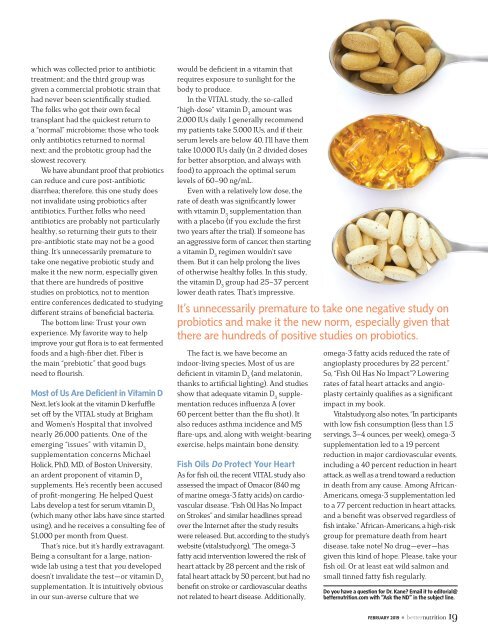Create successful ePaper yourself
Turn your PDF publications into a flip-book with our unique Google optimized e-Paper software.
which was collected prior to antibiotic<br />
treatment; and the third group was<br />
given a commercial probiotic strain that<br />
had never been scientifically studied.<br />
The folks who got their own fecal<br />
transplant had the quickest return to<br />
a “normal” microbiome; those who took<br />
only antibiotics returned to normal<br />
next; and the probiotic group had the<br />
slowest recovery.<br />
We have abundant proof that probiotics<br />
can reduce and cure post-antibiotic<br />
diarrhea; therefore, this one study does<br />
not invalidate using probiotics after<br />
antibiotics. Further, folks who need<br />
antibiotics are probably not particularly<br />
healthy, so returning their guts to their<br />
pre-antibiotic state may not be a good<br />
thing. It’s unnecessarily premature to<br />
take one negative probiotic study and<br />
make it the new norm, especially given<br />
that there are hundreds of positive<br />
studies on probiotics, not to mention<br />
entire conferences dedicated to studying<br />
different strains of beneficial bacteria.<br />
The bottom line: Trust your own<br />
experience. My favorite way to help<br />
improve your gut flora is to eat fermented<br />
foods and a high-fiber diet. Fiber is<br />
the main “prebiotic” that good bugs<br />
need to flourish.<br />
Most of Us Are Deficient in Vitamin D<br />
Next, let’s look at the vitamin D kerfuffle<br />
set off by the VITAL study at Brigham<br />
and Women’s Hospital that involved<br />
nearly 26,000 patients. One of the<br />
emerging “issues” with vitamin D 3<br />
supplementation concerns Michael<br />
Holick, PhD, MD, of Boston University,<br />
an ardent proponent of vitamin D 3<br />
supplements. He’s recently been accused<br />
of profit-mongering. He helped Quest<br />
Labs develop a test for serum vitamin D 3<br />
(which many other labs have since started<br />
using), and he receives a consulting fee of<br />
$1,000 per month from Quest.<br />
That’s nice, but it’s hardly extravagant.<br />
Being a consultant for a large, nationwide<br />
lab using a test that you developed<br />
doesn’t invalidate the test—or vitamin D 3<br />
supplementation. It is intuitively obvious<br />
in our sun-averse culture that we<br />
would be deficient in a vitamin that<br />
requires exposure to sunlight for the<br />
body to produce.<br />
In the VITAL study, the so-called<br />
“high-dose” vitamin D 3<br />
amount was<br />
2,000 IUs daily. I generally recommend<br />
my patients take 5,000 IUs, and if their<br />
serum levels are below 40, I’ll have them<br />
take 10,000 IUs daily (in 2 divided doses<br />
for better absorption, and always with<br />
food) to approach the optimal serum<br />
levels of 60–90 ng/mL.<br />
Even with a relatively low dose, the<br />
rate of death was significantly lower<br />
with vitamin D 3<br />
supplementation than<br />
with a placebo (if you exclude the first<br />
two years after the trial). If someone has<br />
an aggressive form of cancer, then starting<br />
a vitamin D 3<br />
regimen wouldn’t save<br />
them. But it can help prolong the lives<br />
of otherwise healthy folks. In this study,<br />
the vitamin D 3<br />
group had 25–37 percent<br />
lower death rates. That’s impressive.<br />
It’s unnecessarily premature to take one negative study on<br />
probiotics and make it the new norm, especially given that<br />
there are hundreds of positive studies on probiotics.<br />
The fact is, we have become an<br />
indoor-living species. Most of us are<br />
deficient in vitamin D 3<br />
(and melatonin,<br />
thanks to artificial lighting). And studies<br />
show that adequate vitamin D 3<br />
supplementation<br />
reduces influenza A (over<br />
60 percent better than the flu shot). It<br />
also reduces asthma incidence and MS<br />
flare-ups, and, along with weight-bearing<br />
exercise, helps maintain bone density.<br />
Fish Oils Do Protect Your Heart<br />
As for fish oil, the recent VITAL study also<br />
assessed the impact of Omacor (840 mg<br />
of marine omega-3 fatty acids) on cardiovascular<br />
disease. “Fish Oil Has No Impact<br />
on Strokes” and similar headlines spread<br />
over the Internet after the study results<br />
were released. But, according to the study’s<br />
website (vitalstudy.org), “The omega-3<br />
fatty acid intervention lowered the risk of<br />
heart attack by 28 percent and the risk of<br />
fatal heart attack by 50 percent, but had no<br />
benefit on stroke or cardiovascular deaths<br />
not related to heart disease. Additionally,<br />
omega-3 fatty acids reduced the rate of<br />
angioplasty procedures by 22 percent.”<br />
So, “Fish Oil Has No Impact”? Lowering<br />
rates of fatal heart attacks and angioplasty<br />
certainly qualifies as a significant<br />
impact in my book.<br />
Vitalstudy.org also notes, “In participants<br />
with low fish consumption (less than 1.5<br />
servings, 3–4 ounces, per week), omega-3<br />
supplementation led to a 19 percent<br />
reduction in major cardiovascular events,<br />
including a 40 percent reduction in heart<br />
attack, as well as a trend toward a reduction<br />
in death from any cause. Among African-<br />
Americans, omega-3 supplementation led<br />
to a 77 percent reduction in heart attacks,<br />
and a benefit was observed regardless of<br />
fish intake.” African-Americans, a high-risk<br />
group for premature death from heart<br />
disease, take note! No drug—ever—has<br />
given this kind of hope. Please, take your<br />
fish oil. Or at least eat wild salmon and<br />
small tinned fatty fish regularly.<br />
Do you have a question for Dr. Kane? Email it to editorial@<br />
betternutrition.com with “Ask the ND” in the subject line.<br />
FEBRUARY <strong>2019</strong> • 19

















